51.1.3 (51 > 62)
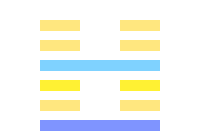
51.1.3 (51 > 62) - THE KĂN HEXAGRAM.
- 1. The first line, undivided, shows its subject, when the movement approaches, looking out and around with apprehension, and afterwards smiling and talking cheerfully. There will be good fortune.
- 3. The third line, divided, shows its subject distraught amid the startling movements going on. If those movements excite him to (right) action, there will be no mistake.
51.1.3 (51 > 62) - Shock
One dreams of escape even though one knows that one should not leave before the goal is reached.
Bing DeepL Google Yandex51.1.3 (51 > 62) - Shock
One dreams of escape even though one knows that one should not leave before the goal is reached.
Bing DeepL Google Yandex51.1.3 (51 > 62) - Kán, l’ébranlement
Kán : tonnerre, effroi répandu, crainte.
- 1. Le tonnerre approchant, on est plein d’effroi ; puis, quand il est passé, on sourit et on parle tous ensemble (on passe de la crainte à la joie).
- 3. Le tonnerre émeut, agite ; il pousse à agir justement.
51.1.3 (51 > 62) - Le choc
On rêve d'évasion bien que l'on sache qu'il ne faut pas partir avant que le but ne soit atteint.
Bing DeepL Google Yandex51.1.3 (51 > 62) - Megrázkódtatás
- 1. Nevethet miután meglátja.
- 3. Meglátva a szakadást otthagyja őket.
The trigrams
The trigrams are combinations of three yin and yang lines. The three bottom lines of the hexagram form the lower trigram and represent the inner situation. The three top lines form the upper trigram and represent the outer situation.
Upper trigram: The thunder

Lower trigram: The thunder The mountain


The formation: 51
What is already there
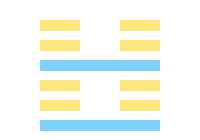
51 - THE KĂN HEXAGRAM.
Kăn gives the intimation of ease and development. When (the time of) movement (which it indicates) comes, (the subject of the hexagram) will be found looking out with apprehension, and yet smiling and talking cheerfully. When the movement (like a crash of thunder) terrifies all within a hundred lî, he will be (like the sincere worshipper) who is not (startled into) letting go his ladle and (cup of) sacrificial spirits.
Bing DeepL Google Yandex51 - Shock
Something is coming which enables the identification of a problem.
Bing DeepL Google Yandex51 - Shock
Something is coming which enables the identification of a problem.
Bing DeepL Google Yandex51 - Kán, l’ébranlement
Kán : tonnerre, effroi répandu, crainte.
Kán« tonnerre, effroi se répandant, appréhension ». Le tonnerre survenant répand l’effroi ; par l’effroi, les rires et les causeries s’arrêtent court. Le tonnerre terrifie cent lis, mais ne doit pas arrêter la cuiller du sacrifice aux esprits (le sacrifice) 1.
1 Le tonnerre peut arrêter tout mais pas empêcher le sacrifice.
Texte
Le tonnerre approchant répand l’effroi ; les rires, les causeries s’arrêtent subitement. Le tonnerre terrifie cent lis, mais ne doit pas arrêter la cuiller du sacrifice aux esprits.
Commentaire
Cet effroi a d’heureux résultats. Les rires et les causeries gardent ainsi la mesure. Le tonnerre terrifie ce qui est loin comme ce qui est près. Mais on doit, quand même, garder le temple des ancêtres, les autels des génies du sol et présider aux sacrifices. (Malgré l’effroi, on ne peut les interrompre.)
Symbolisme
Le tonnerre répété forme l’hexagramme. Le sage, plein de crainte et de scrupules prudents, observe et corrige.
51 - Megrázkódtatás
Valami közelít ami lehetővé teszi a probléma felismerését.
Bing DeepL Google Yandex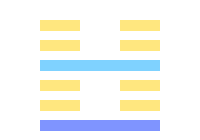
51.1 (51 > 16) - THE KĂN HEXAGRAM.
The first line, undivided, shows its subject, when the movement approaches, looking out and around with apprehension, and afterwards smiling and talking cheerfully. There will be good fortune.
Bing DeepL Google Yandex51.1 (51 > 16) - Kán, l’ébranlement
Kán : tonnerre, effroi répandu, crainte.
Le tonnerre approchant, on est plein d’effroi ; puis, quand il est passé, on sourit et on parle tous ensemble (on passe de la crainte à la joie).
Bing DeepL Google Yandex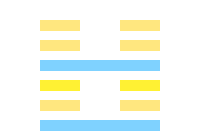
51.3 (51 > 55) - THE KĂN HEXAGRAM.
The third line, divided, shows its subject distraught amid the startling movements going on. If those movements excite him to (right) action, there will be no mistake.
Bing DeepL Google Yandex51.3 (51 > 55) - Kán, l’ébranlement
Kán : tonnerre, effroi répandu, crainte.
Le tonnerre émeut, agite ; il pousse à agir justement.
Bing DeepL Google YandexIn the making: 62
What is poised to happen
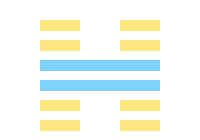
62 - THE HSIÂO KWO HEXAGRAM.
Hsiâo Kwo indicates that (in the circumstances which it implies) there will be progress and attainment. But it will be advantageous to be firm and correct. (What the name denotes) may be done in small affairs, but not in great affairs. (It is like) the notes that come down from a bird on the wing ;---to descend is better than to ascend. There will (in this way) be great good fortune.
Bing DeepL Google Yandex62 - Siao kouoh, la prépondérance du petit
Siaō kouoh : (petit, peu, ou des petits), avancement, manquement, défaut, avancer, dépasser, passer à côté, transgresser.
Siao kouo « petite supériorité (ou des petits) ». Dans tous leurs stades de développement, les petits sont capables de petites choses et pas de grandes. C’est comme le son laissé par le passage d’un oiseau volant, il ne peut pas grandir (s’élever), mais uniquement diminuer (ou baisser) 3.
3 Suite et opposition au n° 28
Texte
Petit avancement. En toute la série de ses actes, le petit peut faire de petites choses, mais point de grandes. C’est comme le bruit fait par le passage d’un oiseau, il ne peut pas grandir, mais seulement diminuer, baisser (Ier sens).
Symbolisme
Cet hexagramme représente le tonnerre au-dessus d’une montagne. Kouoh est manquement. — Le sage, dans ses actions ordinaires, manque par respect insuffisant. — En cas de deuil, on manque quant aux vêtements ; dans les dépenses journalières, on manque par rapport à l’économie.
Commentaire
Si en avançant le petit agit selon les circonstances et qu’il garde le juste milieu, les petites affaires qu’il fera réussiront. Le fort qui perd sa dignité et ne garde pas le milieu ne peut plus, par cela même, rien faire de grand. Il est représenté ici sous la figure de l’oiseau volant ; le bruit de son vol ne peut s’élever, mais uniquement diminuer. — Le grand résiste, le petit cède.
The nuclear hexagram: 39.2.4 (39 > 28)
The nuclear hexagram is the association of the two inner trigrams (lines 2,3,4 and 3,4,5). It represents the root, or the origin of the situation.
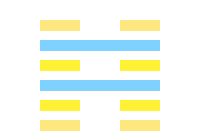
39.2.4 (39 > 28) - THE KIEN HEXAGRAM.
- 2. The second line, divided, shows the minister of the king struggling with difficulty on difficulty, and not with a view to his own advantage.
- 4. The fourth line, divided, shows its subject advancing, (but only) to (greater) difficulties. He remains stationary, and unites (with the subject of the line above).
39.2.4 (39 > 28) - Spending one's days making efforts
One works hard to receive a meager livelihood.
Bing DeepL Google Yandex39.2.4 (39 > 28) - Spending one's days making efforts
One works hard to receive a meager livelihood.
Bing DeepL Google Yandex39.2.4 (39 > 28) - Kién, l’obstacle
Kién : Difficulté, danger, noble hardiesse.
- 2. Si le prince et ses ministres ont difficultés sur difficultés, ce n’est point (nécessairement) parce qu’ils recherchent leur propre avantage (ou : cela ne dépend pas nécessairement d’eux-mêmes).
-
4. Un autre y va et revient uni à ceux qui les ont partagées.
Il faut être fidèle dans ses fonctions.
39.2.4 (39 > 28) - Passer ses journées à faire des efforts
On trime pour recevoir une maigre subsistance.
Bing DeepL Google Yandex39.2.4 (39 > 28) - Bizonytalanság
- 2. Sok nehézség mások táplálásában.
- 4. A többiek nincsenek ott így várnia kell rájuk.
Ruler
The starting situation

51.3 (51 > 55) - THE KĂN HEXAGRAM.
The third line, divided, shows its subject distraught amid the startling movements going on. If those movements excite him to (right) action, there will be no mistake.
Bing DeepL Google Yandex51.3 (51 > 55) - Kán, l’ébranlement
Kán : tonnerre, effroi répandu, crainte.
Le tonnerre émeut, agite ; il pousse à agir justement.
Bing DeepL Google YandexCorrection
The direction where the ruler is going to bend

51.1 (51 > 16) - THE KĂN HEXAGRAM.
The first line, undivided, shows its subject, when the movement approaches, looking out and around with apprehension, and afterwards smiling and talking cheerfully. There will be good fortune.
Bing DeepL Google Yandex51.1 (51 > 16) - Kán, l’ébranlement
Kán : tonnerre, effroi répandu, crainte.
Le tonnerre approchant, on est plein d’effroi ; puis, quand il est passé, on sourit et on parle tous ensemble (on passe de la crainte à la joie).
Bing DeepL Google Yandex
